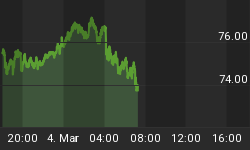US Fed vice-chairman Donald Kohn is in a quandary.
I'm sure he's not alone. It's just that he happened to be tasked with making a set of statements that would have been far too embarrassing for Bernanke to make. That is especially so after Ron Paul publicly slapped him with his own ledger book, so to speak.
Here are the highlights from a transcript of his recent speech before the CFR (Council on Foreign Relations):
"Uncertainties about the economic outlook are unusually high right now. In my view, these uncertainties require flexible and pragmatic policymaking -- nimble is the adjective I used a few weeks ago."
Alright, Jack.
"In general, nonfinancial businesses have been in very good condition and households are meeting their obligations."
Really?? Exactly how "in general" are we talking about, here?
"The degree of deterioration that has happened over the last couple of weeks is not something that I personally anticipated. We are going to have to take a look."
Kinda late, isn't it?
And, here is the nemesis of every English teacher grading papers: Let's just call it "the undecipherable disambiguation":
"The nature of financial market upsets is that they substantially increase the risk of such especially adverse outcomes while possibly having limited effects on the most likely path for the economy,"
Huhh??
Greenspan must still be working for the Fed, teaching seminars on how to lose even the most astute listener within seconds and keep them hanging on, begging for something they can make sense of. Alas, they beg in vain. Instead, we are treated to jewels like this one:
"In general, nonfinancial businesses have been in very good financial condition."
Hmmm ... ohh! ... er, ... what?!!
It would be loads of fun, indeed, to go through the Kohnhead's entire speech and debunk it line by line, but in the interest of brevity (and the reader's sanity) we we forced to restrict ourselves to only the tastiest intellectual morsels.
What he is essentially saying amounts to not much more than this:
- We never thought it would get this bad (or at least we were hoping for the best);
- We're not sure exactly why it got this bad; (That one's a bald-faced lie, by the way.)
- It will get worse before it gets better;
- We will do everything we can to keep banks from going under - investors and consumers be damned;
- We're not afraid of creating moral hazard by bailing out banks (institutional investors) whenever needed. At the same time, we will avoid creating a moral hazard for private investors. (Touching, isn't it? He worries about our morals);
- We are almost out of options, now.
In other words, nothing new, here.
The "almost out of options" part was discussed in our last essay.
Kohn's statements reflected here confirms the conclusions drawn in the previous essay: Should the financial market's tighten up any further, the Fed will be "nimble" enough to create any amount os liquidity necessary to keep the banking guild from undue suffering - at the expense of private investors and consumers, of course.
As we said: nothing new, here.
Fed governors and chairmen would rather be caught running and tripping over barbed wire with their pants around their ankles than admit in public the simple truth that the entire problem we are facing exists because their irresponsible policies - and the entire structure of the federal reserve system - have created too much "liquidity" (speak: debt) over the nine decades of that institution's needless existence.
Their "nimbleness" and "flexibility" in lowering rates all the way to the bitter end, if necessary, will lead them straight into the brick wall called zero-bound interest rates.
After only days ago having dipped below the 4 percent mark, the ten-year treasury note isn't that far from that point, and neither is the federal funds target rate, currently at 4.50 percent.
In either case, banks can rest assured they will be allowed to get as many of their little dollar-sheep as possible safely onto higher ground - while those little fiat-critters that are currently herded by private individuals had better learn how to swim, fast - or find some floating debris.
Got gold?















